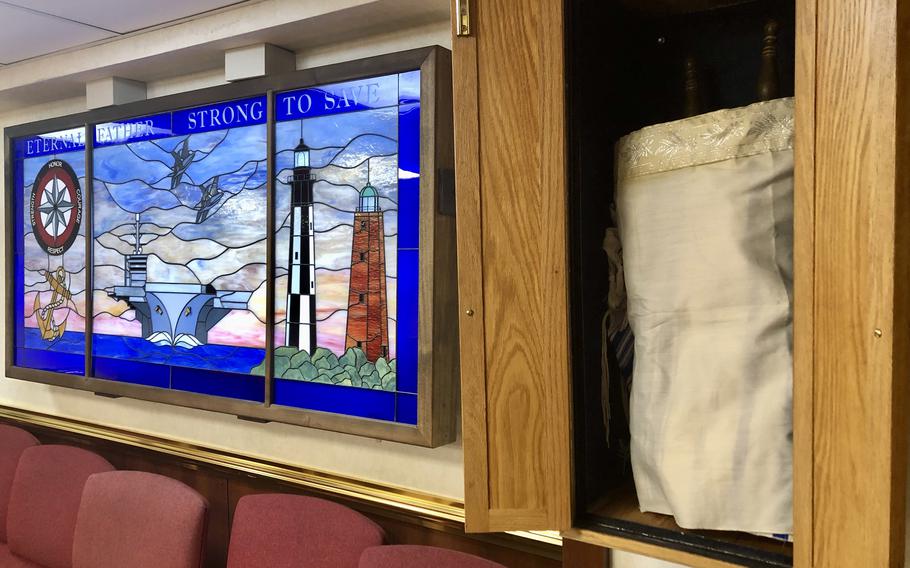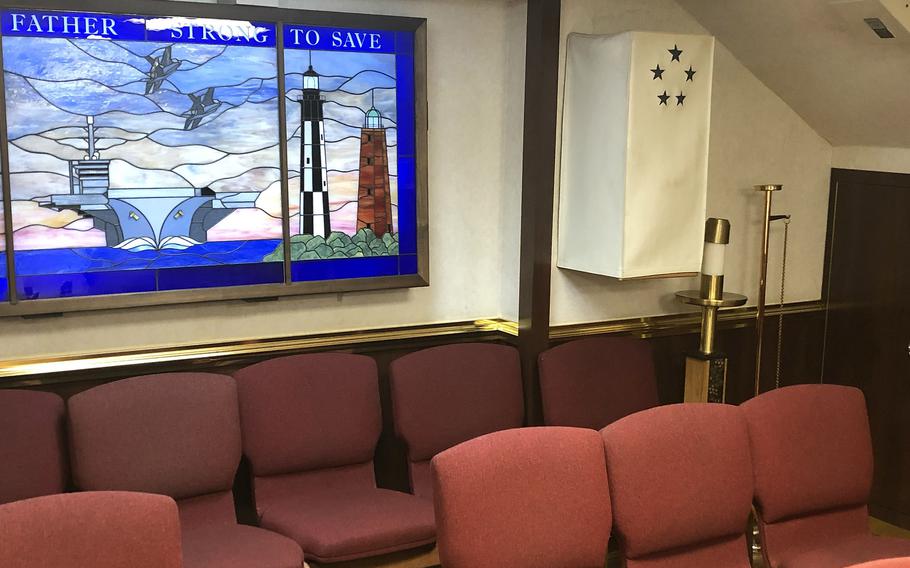
A Torah thought to be written in the 1930s is housed in a wooden cabinet, or ark, in the chapel of the aircraft carrier USS Dwight D. Eisenhower, March 19, 2024. All 11 of the Navy's aircraft carriers have Torahs on loan from the JWB Jewish Chaplains Council. The Torah, which includes the Bible, is the written text of Jewish law and teachings, and is considered to be the most sacred text of Judaism. (Alison Bath/Stars and Stripes)
NAPLES, Italy — The Torah on the aircraft carrier USS Dwight D. Eisenhower, whose namesake led Allied forces to victory against Nazi Germany, serves as spiritual support for sailors in the midst of a fight with Iranian-backed Houthi rebels in Yemen.
The scroll, thought to have been sent to safety in the U.S. during the 1930s as fascism took hold in Europe, has had a home in the carrier’s chapel since 2006.
Many of the ship’s 5,000 people may not know of its presence. But they know of its truths outlined in the founding principles of the U.S. Constitution, said Cmdr. Jay Weatherwax, command chaplain of the Eisenhower and group chaplain for Carrier Strike Group Two.
The Torah, which comprises the first five books of the Bible, is considered the most sacred of Jewish texts.
Contemplating the scroll’s history alongside that of Eisenhower’s legacy, the Holocaust and the lives laid down “in the presence of very real evil” during World War II is awe-inspiring, he said.
“It’s invaluable,” Weatherwax said. “With the Torah here, we have something that symbolizes the presence, the words of God, the instructions for life in the midst of the stuff that we do.”
The Eisenhower and its escorts have been on duty in the Middle East since early November, ordered to the region by Defense Secretary Lloyd Austin as the U.S. worked to keep the Israel-Hamas war from broadening. Since Dec. 31, the carrier’s crew has supported the launch of about 100 daily flights to stem Houthi missile and drone attacks on ships in the Red Sea.
There isn’t a rabbi assigned to Eisenhower, but a service member is training to conduct services for at least 30 identified Jewish sailors aboard the ship, Weatherwax said.

A Torah donated to the aircraft carrier USS Dwight D. Eisenhower is housed in a wooden cabinet, or ark, in the ship's chapel. When not in use, the ark is covered by a white protective fabric case adorned with the ship's signature crest representing Eisenhower's five-star general rank. The Torah is the written text of Jewish law and teachings, including the Bible, and is considered to be the most sacred text of Judaism. (Alison Bath/Stars and Stripes)
The scroll on Eisenhower was donated by an Akron, Ohio, synagogue and is estimated to have been inscribed in the 1930s. It is one of 11 on loan to the fleet’s aircraft carriers from the JWB Jewish Chaplains Council. At least two, including one aboard USS Harry S. Truman, are Holocaust-surviving Torahs, said retired Capt. Irving Elson, a rabbi and director of the council.
A Torah is being hand-copied for the future Ford-class aircraft carrier PCU John F. Kennedy, he said.
Torahs also have been donated to bases and other military-related facilities, including the U.S. presidential summer retreat Camp David in Maryland. Four others are expeditionary scrolls, specially sized for ease of transport to service members on deployment, he said.
While the texts are sacred to Judaism and religious observance, they are not just for Jewish sailors, Elson said.
“The Torah is for every sailor of any faith and those of no faith because written in the Torah are the … principles our country was founded on,” said Elson, who served 35 years as a rabbi in the Navy. He added that the Torahs also serve as a symbol of the religious diversity of each ship.
There aren’t readily available numbers on the religious preferences of the Defense Department’s 1.27 million active-duty service members. But Jews made up about 0.4% of all service members across the services in 2019, according to a National Academies of Sciences, Engineering and Medicine report that same year.
About 70% of U.S. military members were Christian of varying denominations such as Roman Catholic, Protestant and Latter-day Saints. Another 0.4% were Muslim, according to the report.
Being Jewish in the military can be lonely, said Lt. Cmdr. Yonatan Warren, a rabbi assigned to Truman.
Having a Torah onboard a carrier for religious observances allows sailors to transcend that, he said.
“It joins us together in a huge community in the world and makes us not alone,” said Warren, who read from the Torah aboard the Eisenhower during Yom Kippur services in 2021. “Wherever the Torah is, there is community.”
The presence of the scrolls on Navy ships also is evidence of the interwoven history of the U.S. and Jews, who have served in the military and fought in every war since the country’s founding, said Cmdr. Aaron Kleinman, a rabbi assigned to PCU John F. Kennedy.
For example, 550,000 Jewish men and women served in the military during World War II, according to the National World War II Museum in New Orleans.
“There are forces of darkness and evil in the world,” Kleinman said. “They should know they are going to be confronted and they are going to be confronted by the U.S. military and in that U.S. military there are going to be Jewish service members fighting alongside their non-Jewish colleagues and comrades in arms and, God willing, we’re going to win.”